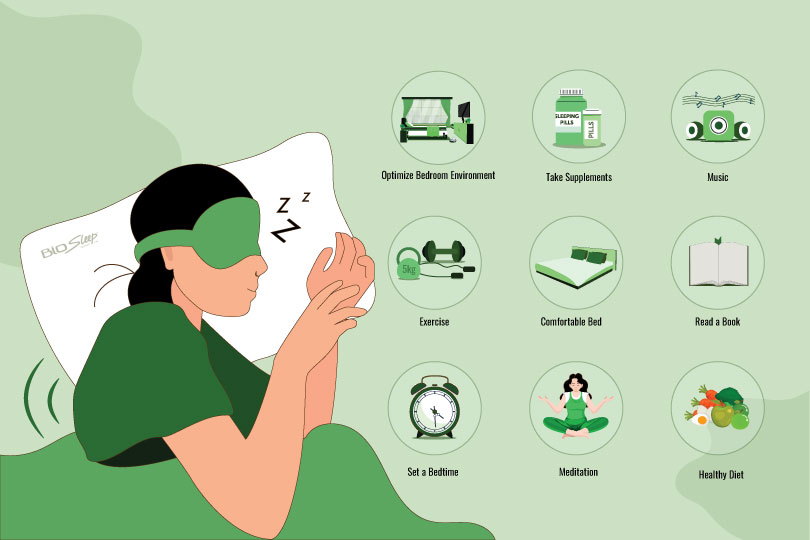Sleep – the ultimate superpower that governs our physical and mental well-being. Yet, many of us struggle with getting quality sleep, often relying on caffeine-fueled stimulants to get by. In this article, we’ll delve into the fascinating realm of natural sleep improvement techniques that harness the mind-body connection to transform your slumber habits.

9 Natural Ways to Sleep Better Every Night
Sleep is a complex phenomenon influenced by various factors – genetics, environment, lifestyle, and even our mental state. As an expert in the field of holistic wellness, I’ve spent years researching and experimenting with natural methods to improve sleep quality. In this article, we’ll explore the latest scientific findings, debunk common myths, and provide actionable tips to help you unlock your full sleep potential.
The Science Behind Sleep: Understanding Your Mind-Body Connection
Sleep is not just a passive state where our bodies rest; it’s an active process that involves complex neural networks, hormone regulation, and even our brain’s neurotransmitters. During sleep, our brains undergo various stages of activity, from relaxation to heightened alertness, which helps us recharge for the next day.
Research has shown that stress hormones like cortisol and adrenaline can significantly disrupt our sleep patterns. When we’re under chronic stress, our bodies release more cortisol, making it harder to fall asleep and stay asleep. On the other hand, relaxation techniques like meditation and deep breathing can help calm the mind-body connection, promoting deeper sleep.
Light Therapy: Harnessing the Power of Natural Light
One of the most effective natural sleep improvement strategies is light therapy. Exposure to bright light in the morning helps regulate our circadian rhythms, while dim red lighting in the evening can signal our bodies that it’s time to sleep.
A study published in the journal Sleep Health found that exposure to bright light in the morning improved sleep quality by 30% and reduced sleep latency (time taken to fall asleep) by 25%. On the other hand, using blue-light blocking glasses or apps before bed can help reduce screen-induced melatonin suppression.
Temperature Therapy: The Science of Cooling Down
Body temperature plays a crucial role in regulating our sleep-wake cycles. Research has shown that a cooler body temperature is associated with improved sleep quality and duration.
A study published in the journal Sleep found that a bedroom temperature of 60-67°F (15-19°C) was ideal for sleep, while temperatures above 70°F (21°C) can disrupt sleep patterns. Using a fan or a cooling pad on a lower body temperature setting can help regulate your body’s natural thermostat.
:max_bytes(150000):strip_icc()/how-to-get-better-sleep-5094084-regular-FINAL-2c371001cada4ad391f6de53fc6053c9.png)
11 Ways to Get Better Sleep
Mindfulness and Relaxation Techniques: Calming the Mind
Mindfulness practices like meditation, deep breathing, and progressive muscle relaxation can help calm the mind-body connection, promoting deeper sleep. By focusing on the present moment, we can reduce stress and anxiety, creating a more conducive environment for restful sleep.
A study published in the Journal of Clinical Sleep Medicine found that mindfulness-based stress reduction (MBSR) significantly improved sleep quality and reduced symptoms of insomnia in individuals with chronic pain.
Herbal Remedies: Nature’s Sleeping Pill
Herbs like valerian root, chamomile, and lavender have been used for centuries to promote relaxation and improve sleep quality. These natural remedies work by reducing anxiety and stress levels, calming the mind-body connection, and promoting deeper sleep.
A study published in the Journal of Sleep Research found that valerian root extract improved sleep quality and reduced sleep latency in individuals with insomnia. While herbal supplements can be effective, it’s essential to consult with a healthcare professional before adding any new remedies to your routine.
Creating a Sleep-Conducive Environment
A well-designed sleep environment is crucial for promoting restful sleep. Consider factors like room temperature, lighting, and noise levels when creating your ideal sleeping sanctuary.
A study published in the Journal of Environmental Psychology found that a dark, quiet, and cool bedroom was essential for improving sleep quality. By investing in blackout curtains, earplugs, or a white noise machine, you can create an environment that promotes deep relaxation and rejuvenation.
Conclusion: Unlocking Your Natural Sleep Potential
In conclusion, natural sleep improvement techniques are within reach when we harness the power of our mind-body connection. By incorporating light therapy, temperature therapy, mindfulness practices, herbal remedies, and a sleep-conducive environment into your daily routine, you can transform your slumber habits and wake up feeling refreshed, revitalized, and ready to take on the day.
Remember, sleep is not just a necessity; it’s an opportunity for our bodies and minds to recharge. By embracing natural sleep improvement strategies, we can unlock our full potential and live healthier, happier lives.

College Life Made Easy » Student Advice Blog

Why We Sleep: Unlocking the Power of Sleep and Dreams – Kindle …

The Complete Book of Dreams Stephanie Gailing 2022 Paperback | eBay
